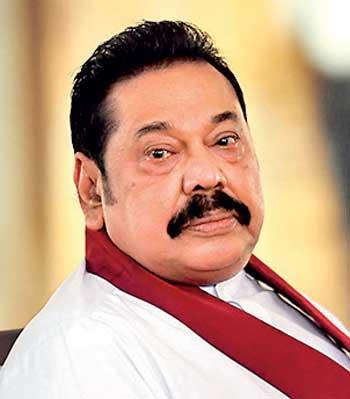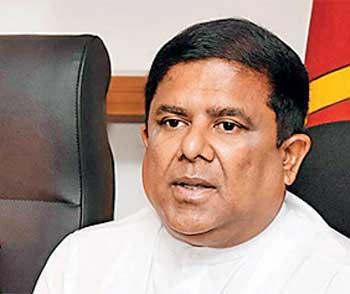20 Jan 2024 - {{hitsCtrl.values.hits}}
Apart from the SLFP which seems to be taking every effort to field its leader, former President Maithripala Sirisena at the race for the top most post amidst a leadership crisis and a danger of MPs of the party deserting the leader, three prominent businessmen have also openly entered the fray
 The statement made by former President Mahinda Rajapaksa on January 15 on the Presidential election that is constitutionally scheduled to be held in September or October this year might be the most important one for those who are interested in that election.
The statement made by former President Mahinda Rajapaksa on January 15 on the Presidential election that is constitutionally scheduled to be held in September or October this year might be the most important one for those who are interested in that election.
The leader of the Sri Lanka Podujana Peramuna (SLPP) told journalists, after a meeting at the Grand Monarch Hotel in Thalawathugoda, that his party had neither decided on a candidate for the Presidential election nor even whether to contest that election.
It was just exactly a month ago, on December 15, the front-liners of the SLPP led by the Rajapaksa family vowed at its second national convention at the Sugathadasa Indoor Stadium to secure victory in all upcoming elections. Now, leave alone winning elections, the party is not in a position to decide whether to contest the  most important election of the country.
most important election of the country.
The SLPP was a party which within two years after it was formed swept the electorate at the 2018 local government elections, the first test of power it encountered after its formation. It also recorded a mammoth victory at the Presidential election in 2019 as well, with its candidate Gotabaya Rajapaksa bagging 6.9 million votes. However, the mismanagement of its first government was such that within three years the country saw the first massive public uprising in its history which forced the President to flee the country.
The twice President Rajapaksa’s statement invalidates all the recent chest thumping by the SLPP leaders on their party’s capacity to face any election. It definitely has a demoralizing impact on the remaining members and supporters of the party that is already fast thinning out.
Sajith Premadasa and Anura Kumara Dissanayake, the leaders of the two Balawegayas - the main Opposition in Parliament, the Samagi Jana Balawegaya (SJB) and the Jathika Jana Balawegaya or the National Peoples’ Power (NPP) - have announced their candidature for the forthcoming Presidential election.
The Management Committee of the UNP has decided on January 9 to field the party leader for the contest. However, SLPP Parliamentarian Namal Rajapaksa had stated later that President Wickremesinghe is also one of the possible candidates who would contest on behalf of his party. Party Chairman Vajira Abeywardena and some other leaders of the party which failed to win a single Parliamentary seat at district level at the last general election claimed that Wickremesinghe would get 10 million votes at the Presidential election.
Apart from the Sri Lanka Freedom Party (SLFP) which seems to be taking every effort to field its leader, former President Maithripala Sirisena at the race for the top most post amidst a leadership crisis and a danger of MPs of the party deserting the leader, three prominent businessmen have
also openly entered the fray.
Dilith Jayaweera, who owns a string of media outlets, rejuvenated the Mavbima Janatha Party (MJP) of Hemakumara Nanayakkara, and was elected to its leadership in last September. He is travelling around the country holding public meetings to introduce himself to the public. Business tycoon, Dammika Perera who was earlier said by the SLPP General Secretary Sagara Kariyawasam to be one of the four possible candidates of his party might have been dumbfounded with the vacillating remarks by the party leader on the party’s Presidential  candidacy. Former Chairman of the Public Utilities Commission of Sri Lanka (PUCSL), Janaka Ratnayake is also occasionally renewing his announcement of candidacy, as if woken up from a deep slumber.
candidacy. Former Chairman of the Public Utilities Commission of Sri Lanka (PUCSL), Janaka Ratnayake is also occasionally renewing his announcement of candidacy, as if woken up from a deep slumber.
Tamil votes, especially those from the north, seem at the moment not to go to any Sinhalese candidate, as a result of the current debate whether Tamils should boycott the election or field a Tamil common candidate. The biggest loser of this debate might be the SJB followed by the NPP. However, the largest portion of Muslim votes, as evident at the moment, would side with the NPP, leaving their leaders who are primarily in the SJB.
However, only the two Balawegayas, seem to be campaigning for the top most race with clear party mandates, with the NPP leader becoming the biggest crowd puller. The huge women’s meetings held by the NPP in Galle, Matara and Hambantota this month have alarmed the other possible main contenders provoking them to launch a scathing attack on the former rebels. They call upon the people not to venture into experiments at elections, which amount to a call to vote for those parties that dragged the country along a destructive path for the past 75 years.
Against this backdrop, politicians in the southern parts of the country seem to be struggling to decide where they should stand in the coming months. No policies or principles matter in these manoeuvrings. Assurances of positions alone would determine everything. Finally, the outcome would justify the means.
Accordingly, the Parliamentarian and former Chief Minister of the Southern Province Shan Wijayalal De Silva ‘summersaulted’ from the SLFP to the SJB on January 1, followed by former UPFA Parliamentarian Dayashritha Tissera on January 4. They were offered organiser posts for the Ambalangoda and Naththandiya electorates respectively, by the SJB leader. Three recent dissidents of the SLPP, Professor G.L.Peiris, Dilan Perera and Dr. Nalaka Godahewa who later became the frontrunners of the newly formed Nidahasa Janatha Sabhawa of Dullas Alahapperuma were also seen at a press briefing of the SJB on January 4.
However, offering positions to the newcomers seems to have created apprehensions among the existing organisers of the SJB, despite it possibly having a luring effect on the likely turncoats of other parties.
The movements of politicians to and from political parties in Sri Lanka are generally not driven by principles but by personal agendas and urges for survival. The groups such as those under Dullas Alahapperuma, Wimal Weeraansa and Anura Priyadarshana Yapa decamped from the SLPP only because they were sidelined by the National Organiser of that party, Basil Rajapaksa.
Wimal Weerawansa and Udaya Gammanpila were removed from the Cabinet by Former President Gotabaya Rajapaksa on March 3, 2022 after they criticised the New Fortress Energy Agreement. However, they managed within a month to persuade Rajapaksa – who was beleaguered by the economic crisis - to sack his cabinet to form an All-Party Government which includes themselves, without any change in that agreement. Had that plan not been scuttled by the Aragalaya they would have been in the government to date.
Vasudeva Nanayakkara of Wimal Weerawansa’s Uththara Lanka Sabhagaya (ULS) had stated days ago that they were prepared to work with the NPP on a plan against the programme involving the IMF. However, sensing a political advance towards them by the ULS, NPP heavyweight Lal Kantha had stated that his party would not entertain the likes of Dullas and Wimal. This might be a valid stance with regard to those who seeking positions, but not others, as without embracing others the NPP cannot be strengthened.
The situation on the ground demands the UNP and the SLPP to work together as the vote banks of both parties have drastically eroded. The claims about ten million votes by the UNP leaders have to be taken with a pinch of salt in the light of the two main parties’ fear of holding local government elections.
UNP leaders who boast about their party having salvaged the country from the economic crisis are blind to the reality on the ground or are pretending to be so. In spite of the absence of queues for fuel and cooking gas, the sufferings endured by the people are more “brutal” than what they underwent in 2022, before and after the Aragalaya. Only the repressive actions by the government have prevented people now from taking to the streets. Unless the two ruling parties accept the situation, the frustration of the people would be manifested at the forthcoming elections in a manner that many parties never revive.
25 Nov 2024 11 minute ago
25 Nov 2024 23 minute ago
25 Nov 2024 25 minute ago
25 Nov 2024 26 minute ago
25 Nov 2024 34 minute ago